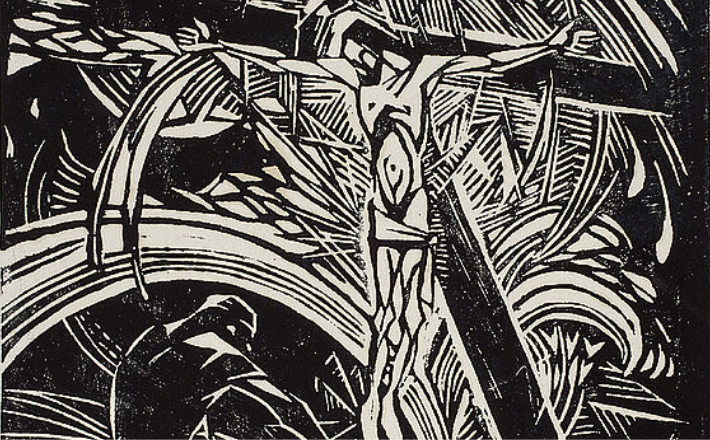Commentary on Luke 23:32-47
We are familiar with the moments of Jesus’ Passion the church remembers in its observation of Good Friday: Jesus’ arrest, Peter’s denials, the cruel abuse of Jesus by his captors, the mockery of a trial before the Sanhedrin with its trumped-up charges, Pilate reluctantly and impotently condemning Jesus to death, Jesus’ crucifixion by the Romans as onlookers jeer and most of Jesus’ followers watch from a distance. Creation and the temple mark Jesus’ death with a failing sun and a tearing curtain.
In Luke’s account of the final stages of Jesus’ Passion, we encounter elements of the story unique to his narrative. Jesus’ examination by Pilate occurs in two segments (23:1–5 and 23:13–25), bracketing a hearing of Jesus before Herod (23:6–12). Luke alone tells us about Jesus’ exchange with the women mourning for him as they follow him to The Skull (23:27–31). In the passage selected by the Narrative Lectionary for Good Friday (23:32–47), other distinctive features of Luke’s account emerge.
- Early in the account, Jesus proclaims, “Father, forgive them, for they know not what they are doing” (verse 34). While this statement is not present in some early manuscripts of the Gospel, the case for its originality is strengthened by the similar statement uttered by Stephen in Luke’s account of his martyrdom (Acts 6:8–7:60): “Lord, do not hold this sin against them” (verse 60).
- Soldiers join with “the leaders” in mocking Jesus (verses 36–37).
- Luke includes the exchange between Jesus and the criminals crucified beside him. One of them joins the leaders and soldiers in mocking Jesus, while the other proclaims Jesus’ innocence and embraces Jesus as King (verses 39–43). To the latter, Jesus promises, “Truly I tell you, today you will be with me in paradise.”
- With his last breath, Jesus cries out, “Father, into your hands I commend my spirit” (verse 46).
- Luke does not include Jesus’ lament, found in both Matthew’s (27:46) and Mark’s (15:34) accounts: “My God, my God, why have you forsaken me?”—echoing Psalm 22.
- The centurion at the cross states, “Certainly this man was innocent/righteous” (verse 47), whereas in Matthew (27:54) and Mark (15:39) the centurion states, “Truly this was the Son of God.”
We cannot delve too deeply here into these distinctive features of Luke’s narration of Jesus’ crucifixion. But collectively they reveal at least four emphases the evangelist features in the shaping of his account.
- First, through the additional scenes with Herod and the wailing of the women accompanying Jesus to The Skull, Luke further underscores the tragic miscarriage of justice that Jesus’ condemnation and crucifixion represent. This is reinforced by the criminal’s (verse 41) and centurion’s (verse 47) professions of Jesus’ innocence.
- Second, Jesus’ remarkable intercession on behalf of those responsible for his death is striking. The offer of divine mercy in the midst of one of the darkest hours of humanity is yet one more incredible manifestation of God’s forbearance and steadfast love within the Passion narrative (see also this year’s Maundy Thursday commentary on Luke 22:1–27). Jesus’ promise to the criminal who trusts in him further accentuates God’s mercy as a counterpoint to the tragedy unfolding before us.
- Third, the offer of God’s mercy in the face of such tragic injustice helps believers and nonbelievers alike understand that the story of Jesus’ crucifixion is not to be remembered and embraced as justification for condemning those who participated in this miscarriage of justice—Jews, Romans, self-serving elite, or even humanity itself—but to be remembered and embraced as a call for repentance that leads to forgiveness and restoration.
- Finally, Luke’s decision to replace Jesus’ desperate lament about being forsaken by God with Jesus’ intercession to God on behalf of his adversaries (verse 34), and Jesus’ final words—“Father, into your hands I commend my Spirit” (verse 46)—emphasize God’s presence in the midst of this desperate moment.
We also find these emphases of Luke’s account—Jesus’ death as a tragic miscarriage of justice, the remarkable offer of divine mercy, the call to repentance, and God’s presence in the midst of this tragedy—rehearsed and amplified through the testimony of his characters in Acts. Peter’s sermon in Acts 3 is a particularly poignant example.
The God of Abraham, the God of Isaac, and the God of Jacob, the God of our ancestors has glorified his servant Jesus, whom you handed over and rejected in the presence of Pilate, though he had decided to release him. But you rejected the Holy and Righteous One and asked to have a murderer given to you, and you killed the Author of life, whom God raised from the dead. To this we are witnesses. …
And now, friends, I know that you acted in ignorance, as did also your rulers. In this way God fulfilled what he had foretold through all the prophets, that his Messiah would suffer. Repent therefore, and turn to God so that your sins may be wiped out, so that times of refreshing may come from the presence of the Lord, and that he may send the Messiah appointed for you, that is, Jesus, who must remain in heaven until the time of universal restoration that God announced long ago through his holy prophets. (Acts 3:13–21)
In our remembrance of Jesus’ Passion, it is difficult not to be overwhelmed by and lost in the tragedy unfolding before us. But even in this hour of blinding darkness and pain, we are to remember, as will Peter and others who fail, that God’s love and mercy and promise of new life are also present. The goodness of this evil day is that God is somehow making a new future possible for those who—like the criminal at Jesus’ side—embrace Jesus as the One who gave himself for us, that we might live.
PRAYER OF THE DAY
Redeeming Creator,
Dust and rocks groan. Deserts and prairies weep. Bushes and trees moan. Rivers and oceans roar. Animals of land, sea, and sky recoil. Sun cowers and moon wanes. Humanity fails. And darkness laughs. But it will not have its way with us forever. Amen.
HYMNS
Ah, holy Jesus ELW 349, H82 158, UMH 289, NCH 218
Jesus, remember me ELW 616, UMH 488
On my heart imprint your image ELW 811
CHORAL
Crucifixus, Antonio Lotti


April 18, 2025